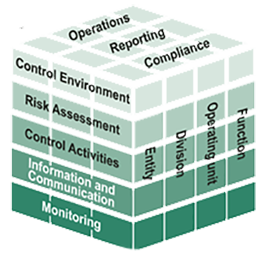


The Framework views all components of internal control as suitable and relevant to all entities, and therefore requires that all components be present and functioning and operating together in an integrated manner. Evaluating whether each component of internal control is present and functioning and whether the components are operating together requires consideration of how components are being applied by the entity within the system of internal control. Each of the five components operating together help to collectively reduce, to an acceptable level, the risk of not achieving an objective. When a component is deemed not to be present and functioning, or when components do not operate together, a major deficiency exists.
Control activities are the actions established through policies and procedures that help ensure that management’s directives to mitigate risks to the achievement of objectives are carried out. Control activities are performed at all levels of the entity, at various stages within business processes, and over the technology environment. They may be preventive or detective in nature and may encompass a range of manual and automated activities such as authorizations and approvals, verifications, reconciliations, and business performance reviews. Segregation of duties is typically built into the selection and development of control activities. Where segregation of duties is not practical, management selects and develops alternative control activities.
Course Description
The course is an overview of the Internal Control Integrated Framework, 2013. The concepts and applications of the new Framework are explored with cases and exercises for practical understanding. The objective of the course is for participants to gain a basic understanding and solid foundation of the concepts, principles and points of focus for each of the components of the Internal Control Integrated Framework.
The course explores the complexities of the Framework from an overview perspective. A short overview of the 1992 Framework is presented in order to compare and contrast the definitions, concepts and approaches of the new Framework. Participants familiar with the prior Framework will be able to add to their knowledge and convert their perspectives to the principles based approach of the new Framework. Those with no prior exposure will be able to acquire a firm understanding of the Framework. This course serves as a prerequisite for the courses dealing with the detailed applications of each of the specific components.
The course was written by Michael L. Piazza, who is the primary presenter for the course. If date conflicts arise, the client will be given the option of a secondary instructor.
Who Should Attend: Anyone in an organization who designs, implements, applies or reviews internal control will greatly benefit from the course and applications. These include: administrators; accountants; finance officers; managers; risk management officers; quality assurance personnel; internal auditors; and anyone providing assurance to internal control and risk management effectiveness.
Description Available Soon
Description Available Soon
Description Available Soon
Description Available Soon